Unit1 单元知识点详解【精彩课堂】 2025-2026 学年九年级英语教学同步精美课件(人教版)
文档属性
| 名称 | Unit1 单元知识点详解【精彩课堂】 2025-2026 学年九年级英语教学同步精美课件(人教版) |  | |
| 格式 | pptx | ||
| 文件大小 | 24.6MB | ||
| 资源类型 | 试卷 | ||
| 版本资源 | 人教新目标(Go for it)版 | ||
| 科目 | 英语 | ||
| 更新时间 | 2025-07-29 19:50:39 | ||
图片预览

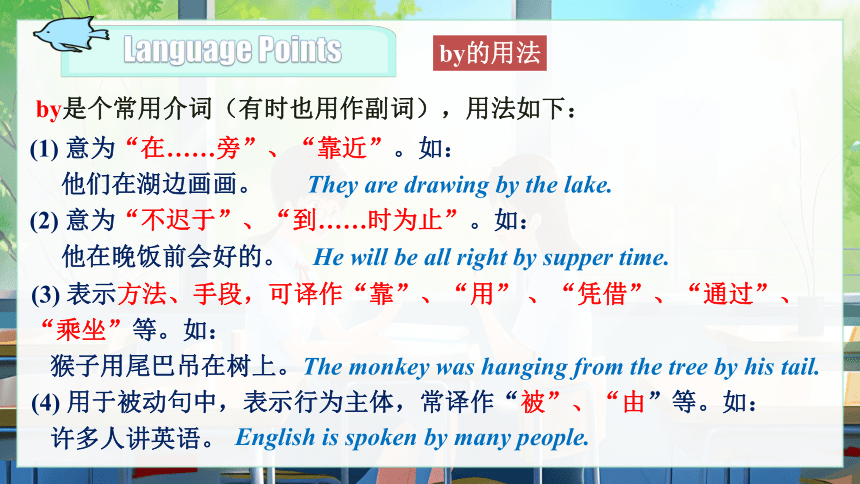
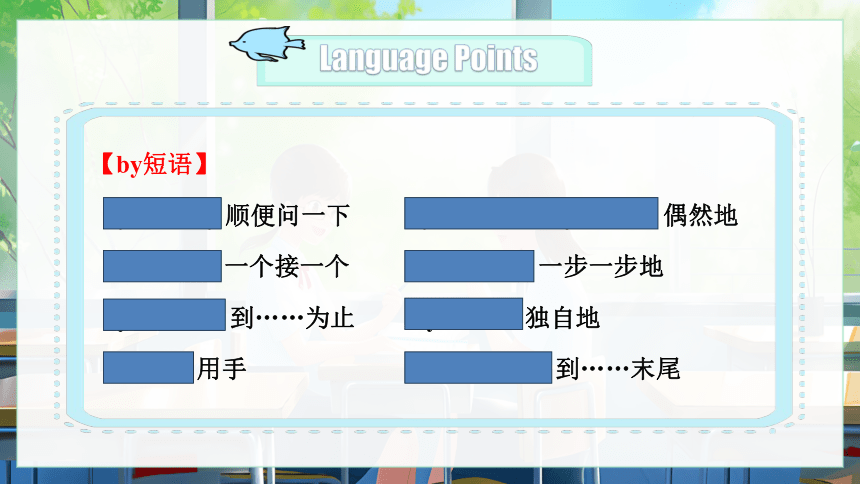
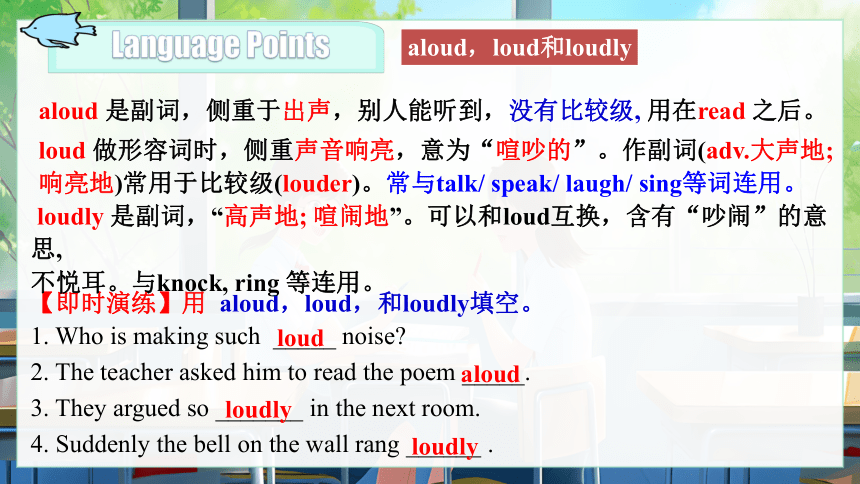
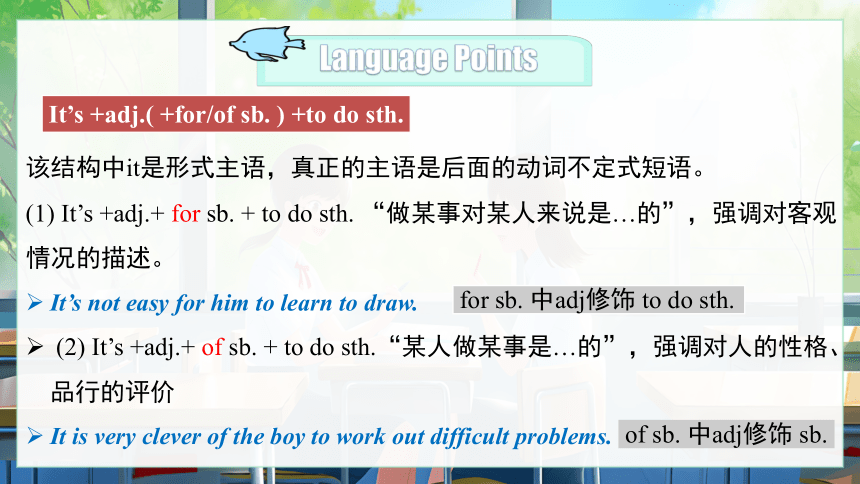
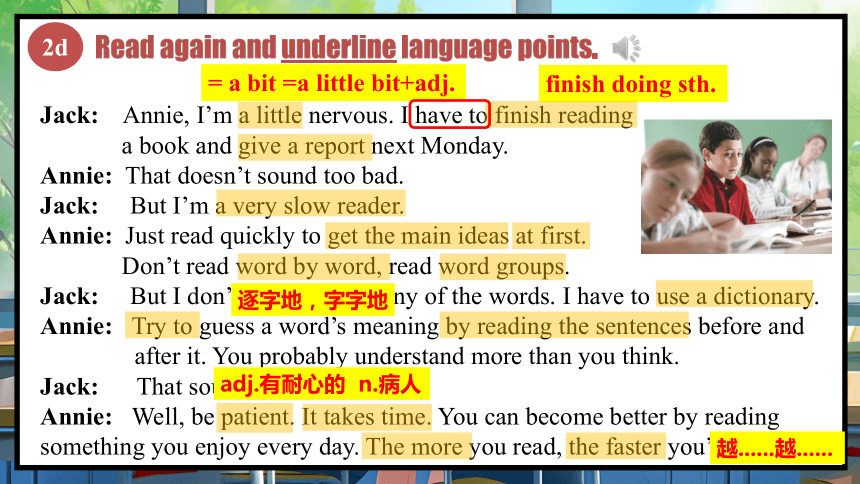
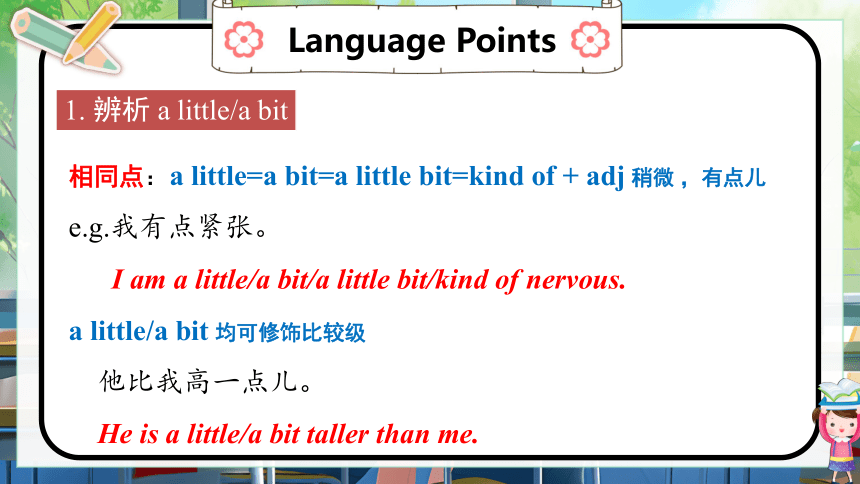

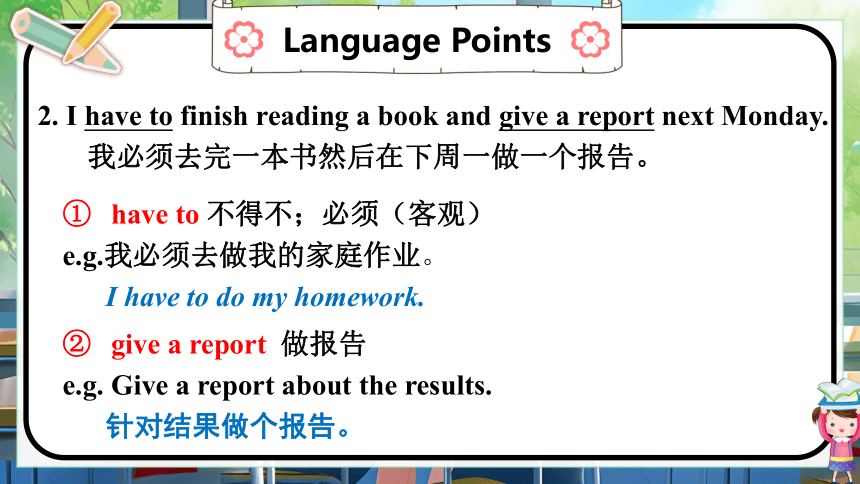
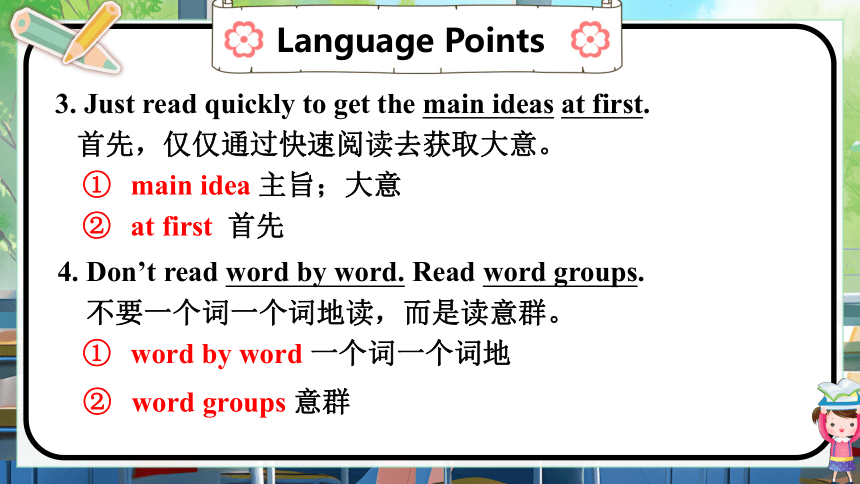
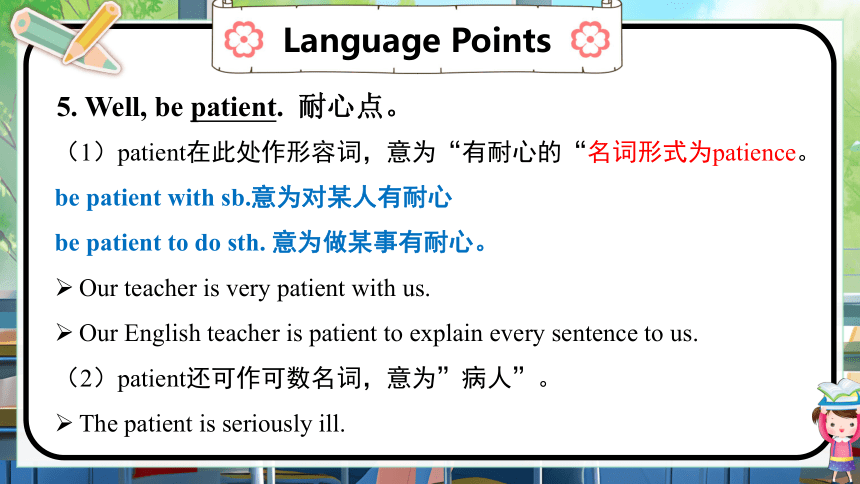
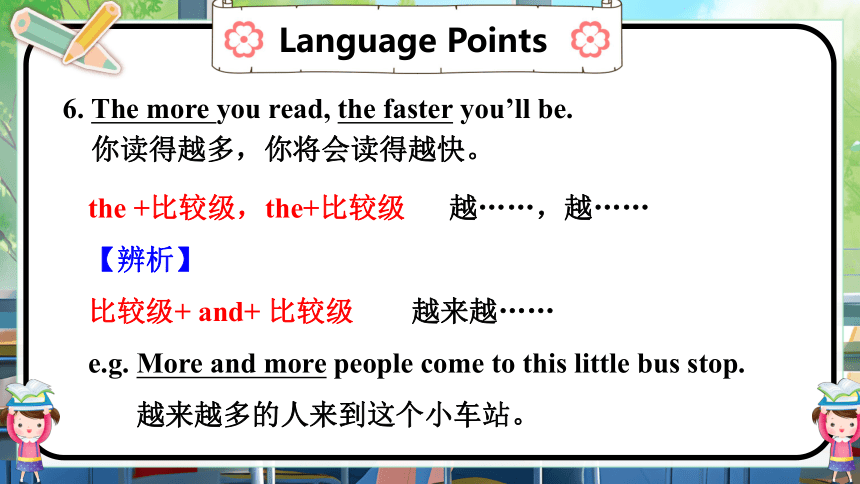
文档简介
(共47张PPT)
Unit1
How can we become good learners
单元知识点详解
Language Points
(1) 意为“在……旁”、“靠近”。如:
他们在湖边画画。 They are drawing by the lake.
(2) 意为“不迟于”、“到……时为止”。如:
他在晚饭前会好的。 He will be all right by supper time.
by是个常用介词(有时也用作副词),用法如下:
(3) 表示方法、手段,可译作“靠”、“用” 、“凭借”、“通过”、“乘坐”等。如:
猴子用尾巴吊在树上。The monkey was hanging from the tree by his tail.
(4) 用于被动句中,表示行为主体,常译作“被”、“由”等。如:
许多人讲英语。
by的用法
English is spoken by many people.
Language Points
【by短语】
by the way 顺便问一下 by accident= by chance 偶然地
one by one 一个接一个 step by step 一步一步地
by the time 到……为止 by oneself 独自地
by hand 用手 by the end of 到……末尾
Language Points
aloud,loud和loudly
1. Who is making such _____ noise
2. The teacher asked him to read the poem _____.
3. They argued so _______ in the next room.
4. Suddenly the bell on the wall rang ______ .
loud
aloud
loudly
loudly
【即时演练】用 aloud,loud,和loudly填空。
aloud 是副词,侧重于出声,别人能听到,没有比较级, 用在read 之后。
loud 做形容词时,侧重声音响亮,意为“喧吵的”。作副词(adv.大声地;响亮地)常用于比较级(louder)。常与talk/ speak/ laugh/ sing等词连用。
loudly 是副词,“高声地; 喧闹地”。可以和loud互换,含有“吵闹”的意思,
不悦耳。与knock, ring 等连用。
Language Points
It’s +adj.( +for/of sb. ) +to do sth.
该结构中it是形式主语,真正的主语是后面的动词不定式短语。
(1) It’s +adj.+ for sb. + to do sth. “做某事对某人来说是…的”,强调对客观情况的描述。
It’s not easy for him to learn to draw.
(2) It’s +adj.+ of sb. + to do sth.“某人做某事是…的”,强调对人的性格、 品行的评价
It is very clever of the boy to work out difficult problems.
for sb. 中adj修饰 to do sth.
of sb. 中adj修饰 sb.
Jack: Annie, I’m a little nervous. I have to finish reading
a book and give a report next Monday.
Annie: That doesn’t sound too bad.
Jack: But I’m a very slow reader.
Annie: Just read quickly to get the main ideas at first.
Don’t read word by word, read word groups.
Jack: But I don’t understand many of the words. I have to use a dictionary.
Annie: Try to guess a word’s meaning by reading the sentences before and
after it. You probably understand more than you think.
Jack: That sounds difficult!
Annie: Well, be patient. It takes time. You can become better by reading something you enjoy every day. The more you read, the faster you’ll be.
Read again and underline language points.
2d
= a bit =a little bit+adj.
finish doing sth.
逐字地,字字地
adj.有耐心的 n.病人
越......越......
Language Points
相同点:a little=a bit=a little bit=kind of + adj 稍微 ,有点儿
e.g.我有点紧张。
I am a little/a bit/a little bit/kind of nervous.
a little/a bit 均可修饰比较级
他比我高一点儿。
He is a little/a bit taller than me.
1. 辨析 a little/a bit
Language Points
不同点:① a little/a bit 一点儿
a little + un(不可数名词) I drink a little milk every morning.
a bit of + un(不可数名词) I drink a bit of milk every morning.
② a little 可做代词,a bit 不可以
---Can you speak Chinese ---Yes,a little.
③ not a little = very 很,非常
not a bit = not...at all 一点儿也不,毫不
I’m not a little happy. 我很快乐。
I’m not a bit happy./I’m not happy at all. 我一点儿也不快乐。
Language Points
2. I have to finish reading a book and give a report next Monday.
我必须去完一本书然后在下周一做一个报告。
have to 不得不;必须(客观)
e.g.我必须去做我的家庭作业。
I have to do my homework.
give a report 做报告
e.g. Give a report about the results.
针对结果做个报告。
Language Points
3. Just read quickly to get the main ideas at first.
首先,仅仅通过快速阅读去获取大意。
main idea 主旨;大意
at first 首先
4. Don’t read word by word. Read word groups.
不要一个词一个词地读,而是读意群。
word by word 一个词一个词地
word groups 意群
Language Points
(1)patient在此处作形容词,意为“有耐心的“名词形式为patience。
be patient with sb.意为对某人有耐心
be patient to do sth. 意为做某事有耐心。
Our teacher is very patient with us.
Our English teacher is patient to explain every sentence to us.
(2)patient还可作可数名词,意为”病人”。
The patient is seriously ill.
5. Well, be patient. 耐心点。
Language Points
6. The more you read, the faster you’ll be.
你读得越多,你将会读得越快。
the +比较级,the+比较级 越……,越……
【辨析】
比较级+ and+ 比较级 越来越……
e.g. More and more people come to this little bus stop.
越来越多的人来到这个小车站。
Last year, I did not like my English class. Every class was like a bad dream. The teacher spoke so quickly that I did not understand her most of the time. I was afraid to ask questions because of my poor pronunciation. I just hid behind my textbook and never said anything.
Read the first paragraph and
underline the language points.
如此...以至于
be afraid to do/of doing sth.害怕做某事
躲在...后面
hide-hid-hidden
because+句子; because of +n.
so...that...表示“如此……以至于……”,引导结果状语从句,其中so为副词,修饰形容词或副词,常见结构有:
Language points
1. The teacher spoke so quickly that I did not...
so...that...结构
Point
so
so +adj./adv.+ that从句 eg:He is so young that he can’t dress himself.
so+ adj.+a/an+可数名词单数+that从句
eg:She is so clever a girl that nobody else in her class can beat her at chess.
so +many/few/much/little(少)+名词+that从句
eg:I have so few friends here that I feel very lonely.
2. I was afraid to ask questions because of my poor pronunciation.
afraid用作形容词,“害怕的;畏惧的”,在句中只能作表语。
含afraid的常用结构有:be afraid of sb. / sth. “害怕某人 / 物”。
be afraid of doing/to do sth. “害怕做某事”。
be afraid + that“恐怕… ”, 用于礼貌地表达可能令人不愉快的消息
1) 我和我的好朋友都害怕我们英语老师。
Both my good friend and I ____________ our English teacher.
2) 我弟弟害怕坐飞机。
My brother _______________________ the plane.
are afraid of
is afraid of taking / to take
be afraid to…
Point
Then one day I watched an English movie called Toy Story. I fell in love with this exciting and funny movie! So I began to watch other English movies, too. Although I could not understand everything the characters said, their body language and the expressions on their faces helped me to get the meaning. I also realized I could get the meaning by listening for just the key words.
Read the second paragraph and
underline the language points.
叫做...=named
面部表情
爱上...
fall-fell-fallen
(1)fall in love with后可接sb.或sth.,表示动作,不可与时间段连用。
(2)be in love with表示“与......相爱”,强调状态,
可与表示一段时间的状语连用。
eg:I have _______ ____ _______ _______ reading.
They have______ ____ ______ _______ each other for twenty years.
3. I fell in love with this exciting and funny movie!
fall in love with 爱上/喜欢上……
Point
fallen in love with
been in love with
Language points
My pronunciation improved as well by listening to the conversations in English movies. I discovered that listening to something interesting is the secret to language learning. I also learned useful sentences like “It’s a piece of cake” or “It serves you right”. I did not understand these sentences at first. But because I wanted to understand the story, I looked them up in a dictionary.
Read the second paragraph and
underline the language points.
也
...的秘密、秘诀
小菜一碟
自作自受
查阅(字典)
通常用于肯定句
4. My pronunciation improved as well by listening to…
通常用于否定句
also as well too either
靠近动词
常用于句末
as well 也;还
Point
【运用】用as well, also, too或either完成句子。
1. If he doesn't go, I won't go ______.
2. In this field he has knowledge and experience _______.
3. Tom likes playing football, and he ______ likes playing basketball.
4. He likes swimming, and his wife likes it, _______.
either
as well
also
too
5. I discovered that listening to something interesting is the secret to
language learning.
(1) discover v. 意为“(出乎意料地)发现;发觉”。
She discovered the cat under the table.
We discovered her to be a good cook.
【辨析】
discover, find, find out, look for 这组词(组)都有“发现”的意思。
discover 指发现或偶然发现原来就存在但一直未被认识的东西。
look for 作“寻找”解时,指寻找的动作和过程。
find 指寻找的结果,即“找到”,是非延续性动词,不如discover正式。
find out 指经过观察、调查把某事、某物查出来,搞清楚,弄明白,多用于复杂而不易直接查出的情况。
(2) 这句话中that引导一个宾语从句,在这个宾语从句中主语是listening to something interesting,是一个动名词短语。
Riding a bike can make a man smart.
Our plan must remain a secret.
He made no secret of his dislike for me.
(3) secret n. 意为“秘密;秘诀”。
in secret 意为“偷偷地,暗地里”。
He has left the country in secret.
keep sth. a secret from/keep a/the secret from 意为“对……保守秘密”。
I keep nothing a secret from you.
a piece of cake和serve sb. right 都是英语的习惯用语,也可称作习语(idiom) ,类似于汉语的成语。习语是人们在长期的语言运用中确定或形成的一种固定表达方式,所表达的意思不能从字面上去理解。
eg:Practice makes perfect.
熟能生巧。
Love me, love my dog.
爱屋及乌。
Actions speak louder than words.
行动胜于言辞。
6. “It’s a piece of cake.” “It serves you right.”
英语习语
Point
(1)look up在此处意为“查阅”,可接名词或代词作宾语。宾语如果为代词要
放在look和up之间;如果是名词,放在look和up之间或up之后均可。
eg:You can look up this word in the vocabulary.
=You can look this word up in the vocabulary.
Can you look it up on the website
(2)look up还可意为“抬头看”,常和from连用。
eg:She looked up from her book as I entered the room.
7. ...I looked them up in a dictionary.
look up (在词典、参考书中或通过电脑)查阅;抬头看
Point
只能放在look与up之间
Read the third paragraph and
underline the language points.
Now I really enjoy my English class. I want to learn new words and more grammar so that I can have a better understanding of English movies.
为了,以便于
更好理解...
so that引导的目的状语从句
(1)本句中,so that意为“以便;为了”,常用来引导目的状语从句,从句中常
有can, could, should等情态动词。 可与in order that互换。
eg:He got up early this morning so that he could catch the early bus.
= He got up early this morning in order that he could catch the early bus.
(2)so that 意为“因此,所以”,引导结果状语从句,
此时从句中一般不含can, could等情态动词。
eg:Li Lei studied hard, so that he passed the exam.
8. ...so that I can have a better understanding of...
Point
Language Points
1. I can’t always understand spoken English.
(1) not always意为_________________________。当not与 always, both, all, everyone, everything等词连用时,表示___________。
如:有钱人不一定总是幸福的。
Those who have lots of money are ________________.
并非人人都喜欢这部电影。
___________ likes the film.
(2) spoken English意为________;written English意为__________。
如:我并非总是能听懂英语口语。
I can’t always understand ______________.
他的书面语很好。
His _____________ is very good.
“不一定总是;未必总是”
部分否定
“口语”
“书面语”
not always happy
Not everyone
spoken English
written English
Language Points
2. I don’t know how to increase my reading speed.
(1) “疑问词+不定式”结构 。
类似的有:what/which/when/where/how+不定式短语作宾语 ,可与宾语从句转换。
= I don’t know how I can increase my reading speed.
注意: I don’t know which room_____________(我不知道住哪间房)
to live in
to live in the room 动宾关系 介词不能省略
这种结构在句中可作主语、宾语、表语等,作主语时,谓语动词用单数形式。
eg:How to deal with it is still a question.如何解决它仍然是一个问题。(作主语)
I don’t know what to have for dinner.我不知道晚餐吃什么。(作宾语)
The question is which to choose.问题是选哪一个。(作表语)
Language Points
2. I don’t know how to increase my reading speed.
(2) increase v. 增加;增长;提高
博览群书会增加你的词汇量。
Wide reading will___________ your vocabulary.
地球上的人口增长得很快。
The population of the earth is ___________fast.
increase
increasing
拓展:increase by + 倍数、分数等 增长了
increase to +具体数字 增长到
Traffic accidents _________________three percent in the past year.
The director hopes to be able to ________your pay _____6000 yuan a month.
have increased by
increase
to
Language Points
2. I don’t know how to increase my reading speed.
(3) speed ( n / v speed- sped- sped)
【拓展】
at a speed of… 以…速度;
at high/low speed 以高/低速
I don’t know how to increase my reading _____.
The car is running ___________ 180 kilometers.
speed
at a speed of
Language Points
3. I often make mistakes in grammar.
mistake n.
make mistakes 犯错
by mistake错误地
make mistakes in 在某方面犯错
honest mistakes 无心的失误
【语境应用】用mistake短语完成句子。
1) Never be afraid of ________________ while studying.
2) Please believe me. It was a(n) _______________.
3) They got on the No. 86 bus __________ yesterday.
making mistakes
by mistake
honest mistake
Language Points
4. He can’t get the pronunciation right.
get在此处意为“使,让”。
He can’t get the pronunciation right.
主语
谓语
宾语
宾语补足语
“get+宾语+宾语补足语”的常见结构有:
eg:Don’t get your dress dirty!
eg:Get your father to come tomorrow.
eg:Can you get the machine running
eg:I want to get my bike repaired.
Language Points
5. I’m having trouble learning English.
have trouble/difficulty/problems (in) doing sth.表示“做某事有困难”,其中的介词 in 可以省略。
I have some trouble (in) reading her handwriting.
我认她的笔迹有些困难。
We had no trouble (in) finding his house.
我们没费吹灰之力就找到了他的家。
have fun (in) doing sth. 做某事有意思(有趣)
have a good time (in) doing sth. 做某事很开心
have a hard time (in) doing sth. 做某事很辛苦
常用提建议的句型
◆ 表责备性建议的句型:
Why don't you do sth. = Why not do sth. ____________________。
你为什么不做某事?
◆ 表委婉性建议:
Shall we do sth. ______________________
Would you mind (not) doing sth. _____________________
我们做某事好吗?
你介意(不)做某事吗?
◆ 直接性的建议的句子:
Let’s do sth. 表示___________________。
Let us+do sth. 表示__________________。
“让我们做某事”
“让我们做某事”
(包括双方在内)
(不包括对方在内)
◆ 表请求性建议:
Would you like sth. /(not) to do sth. ___________________________
你想要某物/你(不)想要做某事吗?
常用提建议的句型
◆ 表劝告性建议:
You/We had better do sth. _________________________
=You/We’d better do sth. ____________________________
你(们)/我们最好做某事。
你(们)/我们最好做某事。
◆ 表征求性建议:
What/How about (doing) sth. ________________________
(做)某事/某物怎么样?
◆ 其他一些表建议的句型
You/We should (not) do sth. ________________________________
You/We could…… _______________________
你(们)/我们(不)应该做某事。
你(们)/我们可以……
◆ perhaps也可用于提建议,常位于句首。
Language Points
Everyone is born with the ability to learn. But whether or not you can do this well depends on your learning habits. Research shows that successful learners have some good habits in common.
Creating an interest in what they learn
Studies show that if you are interested in something, your brain is more active and it is also easier for you to pay attention to it for a long time. Good learners often connect what they need to learn with something interesting. For example, if they need to learn English and they like music or sports, they can listen to
English songs or watch sports programs in English. This way they will not get bored.
the ability to do sth.做某事的能力
be born with 天生具有
注意;关注。to是介词
n. 大脑
adj. 活跃的,积极的
把......和…...联系起来
是否
依靠;取决于
学习习惯
有......共同之处
激发对...的兴趣
对......感兴趣
例如
听英文歌
看英文体育节目
感到厌烦
1. Everyone is born with the ability to learn. 每个人天生都具有学习的能力。
(1) be born with 意为“天生具有”,常指生来就具有某种天分、性格或患有某种疾病等。
She was born with a gift for music.
(2) the ability to do sth. 意为“做某事的能力”,其中ability 意为“能力;
才能”。
He has the ability to speak English fluently.
Language points
【拓展】
① be born意为“出生;出世”,为被动语态,当说明某(些)人的出生情况时,be动词通常用was或were。
He was born in Beijing on October 9, 1998.
② born用作形容词时,意为“天生的”,通常置于名词前作定语。
He is a born poet.
2. But whether or not you can do this well depends on your learning habits. 但是你是否能把这做好取决于你的学习习惯。
(1) 此句中whether or not you can do this well是一个从句,作整个句子的主语,这种从句叫主语从句。单个主语从句作主语时,谓语动词用单数。
Whether they would support us was a problem.
(2) whether or not是英语从句的一个连词结构,意思和功能相当于whether,意为“是否”,常出现在宾语从句、主语从句中。whether or not也可写作whether…or not,or not放在句末。
I don’t know whether or not I should believe him.
3. Creating an interest in what they learn. 培养对所学知识的兴趣。
Jim has created some new songs. 吉姆创作了一些新歌。
The man discovered some jewels in the box. 这个男人在那个盒子里发现了一些珠宝。
Edison invented the electric light bulb. 爱迪生发明了电灯泡。
create 创造;创建 创造出原来并不存在的东西,其对象往往是精神上的,如艺术、文学作品中的人物及新的科学领域等。也可指创造出新的具体事物。
discover 发现;发觉 某种自然界本来已存在,但以前未被人类发现或认识的事物,如发现元素、电、煤、石油、铁等以及新星、星系等。
invent 发明;创造 指创造出原来自然界不存在的东西,其对象往往是物质性的,尤指科技上的发明创造,如工具、方法、灯泡、汽车、电视、合成材料等。
4. Studies show that if you are interested in something, your brain is more active and it is also easier for you to pay attention to it for a long time. 研究表明,如果你对某事感兴趣,你的大脑就会更活
跃,你也更容易长时间关注它。
(1) active 用作形容词,意为“活跃的;积极的”。常用短语:take an active part in sth. 意为“积极参与某事”。
You are supposed to be an active learner.
Encourage students to take an active part in discussions.
(2) pay attention to 意为“注意;关注”,其中to为介词,其后可跟名词、代词或动词-ing形式。
You’d better pay more attention to your pronunciation.
5. Good learners often connect what they need to learn with something interesting. 好的学习者常常将他们需要学习的东西与感兴趣的东西联系起来。
connect…with... 意为“把……和……连接或联系起来”,其中connect用作及物动词,意为“(使)连接;与……有联系”。connect的常用短语还有:be connected with… 意为“与……有关系;与……有亲戚关系”。
A railway connects Beijing with Shanghai.
【拓展】connect的名词形式为connection,意为“连接;关系”。
There’s a connection between pollution and the death of trees.
Practicing and learning from mistakes
Good learners think about what they are good at and what they need to practice more. Remember, “Use it or lose it.” Even if you learn something well, you will forget it unless you use it. “Practice makes perfect.” Good learners will keep practicing what they have learned, and they are also not afraid of making mistakes. Alexander Graham Bell did not invent the telephone overnight. He succeeded by trying many times and learning from his mistakes.
Language Points
keep doing sth. 一直做某事
be afraid of doing sth. 害怕做某事
从...中学习
思考、考虑
be good at..=do well in...擅长于
用进废退
=even though即使
除非,如果不=if not
熟能生巧
发明
一夜之间
尝试很多次
6. Even if you learn something well, you will forget it unless you use it. 即使有些东西你学得很好,如果不使用它,你也会忘记。
(1) even if 意为“即使;虽然”,有退一步设想的意味,用来引导让步状语从句,相当于even though。
Even if you work till midnight, you won’t finish it.
(2) unless是连词,意为“除非;如果不”,引导条件状语从句,相当于if...not,在许多情况下二者可以互换。
You will fail the exam unless you work hard.
= If you don’t work hard, you will fail the exam.
Don’t come unless I telephone you.
Developing their study skills
It is not enough to just study hard. Good learners know the best way they can study. For example, they may take notes by writing down key words or by drawing mind maps. They also look for ways to review what they have learned. They may do this by reading their notes every day or by explaining the information to another student.
Language Points
Asking questions
Good learners often ask questions during or after class. They even ask each other and try to find out the answers. Knowledge comes from questioning.
Learning is a lifelong journey because every day brings something new. Everything that you learn becomes a part of you and changes you, so learn wisely and learn well.
学习技巧
做...是不够的
the best way to do sth
记笔记
写下关键词
画思维导图
寻找做某事的方式
explain sth to sb 向某人解释某事
课内外
互相,彼此
查明,弄清楚
n. 知识;学问
adv. 明智地;聪明地
...的一部分
学习是一个终生的旅程。
7. They also look for ways to review what they have learned. 他们还寻找方法来复习他们所学的知识。
(1)review在此处作动词,由“re-(前缀)+view”构成。意为“回顾,复习”。
eg:He needs to review what the teacher said in class.
他需要复习老师在课堂上讲的内容。
(2)review还可作名词,意为“回顾;复习” 。
eg:The boss asked the staff to write a review of this year.
老板让员工写年终汇报。
8. Knowledge comes from questioning. 知识源于质疑
knowledge常用作不可数名词。但有时可用a knowledge,
常与介词of或 about 连用,表示“……方面的知识”。
eg:Knowledge is power.
知识就是力量。
He has a wide knowledge of painting and music.
他在绘画和音乐方面知识渊博。
knowledgeable 知识渊博的
Fill in the blanks with the words in the box.
practice develop remember prepare
take notes until worry about everything
Are you stressed out each time you have a test You don’t have to be if you ________ smart study skills. Remember to__________ in class and review them on your own or with friends after class. Then _________ what you learned by doing exercises. Try to study and __________ information bit by bit instead of waiting ________ the last minute to study __________ at once. If you ________ well for a test, then there's nothing to ___________!
develop
take notes
practice
remember
until
everything
prepare
worry about
Self Check 1
紧张;焦虑(=be nervous)
remember to do sth. 记得要做某事(还没做)
remember doing sth. 记得做过某事(已经做了)
独自;独立地(相当于alone或by oneself)
代替;而不是
instead of (介词短语)后接名词、代词或v-ing形式
instead (副词)常位于句首或句末
bit by bit 一点一点
prepare…for 为…准备
立即
Unit1
How can we become good learners
单元知识点详解
Language Points
(1) 意为“在……旁”、“靠近”。如:
他们在湖边画画。 They are drawing by the lake.
(2) 意为“不迟于”、“到……时为止”。如:
他在晚饭前会好的。 He will be all right by supper time.
by是个常用介词(有时也用作副词),用法如下:
(3) 表示方法、手段,可译作“靠”、“用” 、“凭借”、“通过”、“乘坐”等。如:
猴子用尾巴吊在树上。The monkey was hanging from the tree by his tail.
(4) 用于被动句中,表示行为主体,常译作“被”、“由”等。如:
许多人讲英语。
by的用法
English is spoken by many people.
Language Points
【by短语】
by the way 顺便问一下 by accident= by chance 偶然地
one by one 一个接一个 step by step 一步一步地
by the time 到……为止 by oneself 独自地
by hand 用手 by the end of 到……末尾
Language Points
aloud,loud和loudly
1. Who is making such _____ noise
2. The teacher asked him to read the poem _____.
3. They argued so _______ in the next room.
4. Suddenly the bell on the wall rang ______ .
loud
aloud
loudly
loudly
【即时演练】用 aloud,loud,和loudly填空。
aloud 是副词,侧重于出声,别人能听到,没有比较级, 用在read 之后。
loud 做形容词时,侧重声音响亮,意为“喧吵的”。作副词(adv.大声地;响亮地)常用于比较级(louder)。常与talk/ speak/ laugh/ sing等词连用。
loudly 是副词,“高声地; 喧闹地”。可以和loud互换,含有“吵闹”的意思,
不悦耳。与knock, ring 等连用。
Language Points
It’s +adj.( +for/of sb. ) +to do sth.
该结构中it是形式主语,真正的主语是后面的动词不定式短语。
(1) It’s +adj.+ for sb. + to do sth. “做某事对某人来说是…的”,强调对客观情况的描述。
It’s not easy for him to learn to draw.
(2) It’s +adj.+ of sb. + to do sth.“某人做某事是…的”,强调对人的性格、 品行的评价
It is very clever of the boy to work out difficult problems.
for sb. 中adj修饰 to do sth.
of sb. 中adj修饰 sb.
Jack: Annie, I’m a little nervous. I have to finish reading
a book and give a report next Monday.
Annie: That doesn’t sound too bad.
Jack: But I’m a very slow reader.
Annie: Just read quickly to get the main ideas at first.
Don’t read word by word, read word groups.
Jack: But I don’t understand many of the words. I have to use a dictionary.
Annie: Try to guess a word’s meaning by reading the sentences before and
after it. You probably understand more than you think.
Jack: That sounds difficult!
Annie: Well, be patient. It takes time. You can become better by reading something you enjoy every day. The more you read, the faster you’ll be.
Read again and underline language points.
2d
= a bit =a little bit+adj.
finish doing sth.
逐字地,字字地
adj.有耐心的 n.病人
越......越......
Language Points
相同点:a little=a bit=a little bit=kind of + adj 稍微 ,有点儿
e.g.我有点紧张。
I am a little/a bit/a little bit/kind of nervous.
a little/a bit 均可修饰比较级
他比我高一点儿。
He is a little/a bit taller than me.
1. 辨析 a little/a bit
Language Points
不同点:① a little/a bit 一点儿
a little + un(不可数名词) I drink a little milk every morning.
a bit of + un(不可数名词) I drink a bit of milk every morning.
② a little 可做代词,a bit 不可以
---Can you speak Chinese ---Yes,a little.
③ not a little = very 很,非常
not a bit = not...at all 一点儿也不,毫不
I’m not a little happy. 我很快乐。
I’m not a bit happy./I’m not happy at all. 我一点儿也不快乐。
Language Points
2. I have to finish reading a book and give a report next Monday.
我必须去完一本书然后在下周一做一个报告。
have to 不得不;必须(客观)
e.g.我必须去做我的家庭作业。
I have to do my homework.
give a report 做报告
e.g. Give a report about the results.
针对结果做个报告。
Language Points
3. Just read quickly to get the main ideas at first.
首先,仅仅通过快速阅读去获取大意。
main idea 主旨;大意
at first 首先
4. Don’t read word by word. Read word groups.
不要一个词一个词地读,而是读意群。
word by word 一个词一个词地
word groups 意群
Language Points
(1)patient在此处作形容词,意为“有耐心的“名词形式为patience。
be patient with sb.意为对某人有耐心
be patient to do sth. 意为做某事有耐心。
Our teacher is very patient with us.
Our English teacher is patient to explain every sentence to us.
(2)patient还可作可数名词,意为”病人”。
The patient is seriously ill.
5. Well, be patient. 耐心点。
Language Points
6. The more you read, the faster you’ll be.
你读得越多,你将会读得越快。
the +比较级,the+比较级 越……,越……
【辨析】
比较级+ and+ 比较级 越来越……
e.g. More and more people come to this little bus stop.
越来越多的人来到这个小车站。
Last year, I did not like my English class. Every class was like a bad dream. The teacher spoke so quickly that I did not understand her most of the time. I was afraid to ask questions because of my poor pronunciation. I just hid behind my textbook and never said anything.
Read the first paragraph and
underline the language points.
如此...以至于
be afraid to do/of doing sth.害怕做某事
躲在...后面
hide-hid-hidden
because+句子; because of +n.
so...that...表示“如此……以至于……”,引导结果状语从句,其中so为副词,修饰形容词或副词,常见结构有:
Language points
1. The teacher spoke so quickly that I did not...
so...that...结构
Point
so
so +adj./adv.+ that从句 eg:He is so young that he can’t dress himself.
so+ adj.+a/an+可数名词单数+that从句
eg:She is so clever a girl that nobody else in her class can beat her at chess.
so +many/few/much/little(少)+名词+that从句
eg:I have so few friends here that I feel very lonely.
2. I was afraid to ask questions because of my poor pronunciation.
afraid用作形容词,“害怕的;畏惧的”,在句中只能作表语。
含afraid的常用结构有:be afraid of sb. / sth. “害怕某人 / 物”。
be afraid of doing/to do sth. “害怕做某事”。
be afraid + that“恐怕… ”, 用于礼貌地表达可能令人不愉快的消息
1) 我和我的好朋友都害怕我们英语老师。
Both my good friend and I ____________ our English teacher.
2) 我弟弟害怕坐飞机。
My brother _______________________ the plane.
are afraid of
is afraid of taking / to take
be afraid to…
Point
Then one day I watched an English movie called Toy Story. I fell in love with this exciting and funny movie! So I began to watch other English movies, too. Although I could not understand everything the characters said, their body language and the expressions on their faces helped me to get the meaning. I also realized I could get the meaning by listening for just the key words.
Read the second paragraph and
underline the language points.
叫做...=named
面部表情
爱上...
fall-fell-fallen
(1)fall in love with后可接sb.或sth.,表示动作,不可与时间段连用。
(2)be in love with表示“与......相爱”,强调状态,
可与表示一段时间的状语连用。
eg:I have _______ ____ _______ _______ reading.
They have______ ____ ______ _______ each other for twenty years.
3. I fell in love with this exciting and funny movie!
fall in love with 爱上/喜欢上……
Point
fallen in love with
been in love with
Language points
My pronunciation improved as well by listening to the conversations in English movies. I discovered that listening to something interesting is the secret to language learning. I also learned useful sentences like “It’s a piece of cake” or “It serves you right”. I did not understand these sentences at first. But because I wanted to understand the story, I looked them up in a dictionary.
Read the second paragraph and
underline the language points.
也
...的秘密、秘诀
小菜一碟
自作自受
查阅(字典)
通常用于肯定句
4. My pronunciation improved as well by listening to…
通常用于否定句
also as well too either
靠近动词
常用于句末
as well 也;还
Point
【运用】用as well, also, too或either完成句子。
1. If he doesn't go, I won't go ______.
2. In this field he has knowledge and experience _______.
3. Tom likes playing football, and he ______ likes playing basketball.
4. He likes swimming, and his wife likes it, _______.
either
as well
also
too
5. I discovered that listening to something interesting is the secret to
language learning.
(1) discover v. 意为“(出乎意料地)发现;发觉”。
She discovered the cat under the table.
We discovered her to be a good cook.
【辨析】
discover, find, find out, look for 这组词(组)都有“发现”的意思。
discover 指发现或偶然发现原来就存在但一直未被认识的东西。
look for 作“寻找”解时,指寻找的动作和过程。
find 指寻找的结果,即“找到”,是非延续性动词,不如discover正式。
find out 指经过观察、调查把某事、某物查出来,搞清楚,弄明白,多用于复杂而不易直接查出的情况。
(2) 这句话中that引导一个宾语从句,在这个宾语从句中主语是listening to something interesting,是一个动名词短语。
Riding a bike can make a man smart.
Our plan must remain a secret.
He made no secret of his dislike for me.
(3) secret n. 意为“秘密;秘诀”。
in secret 意为“偷偷地,暗地里”。
He has left the country in secret.
keep sth. a secret from/keep a/the secret from 意为“对……保守秘密”。
I keep nothing a secret from you.
a piece of cake和serve sb. right 都是英语的习惯用语,也可称作习语(idiom) ,类似于汉语的成语。习语是人们在长期的语言运用中确定或形成的一种固定表达方式,所表达的意思不能从字面上去理解。
eg:Practice makes perfect.
熟能生巧。
Love me, love my dog.
爱屋及乌。
Actions speak louder than words.
行动胜于言辞。
6. “It’s a piece of cake.” “It serves you right.”
英语习语
Point
(1)look up在此处意为“查阅”,可接名词或代词作宾语。宾语如果为代词要
放在look和up之间;如果是名词,放在look和up之间或up之后均可。
eg:You can look up this word in the vocabulary.
=You can look this word up in the vocabulary.
Can you look it up on the website
(2)look up还可意为“抬头看”,常和from连用。
eg:She looked up from her book as I entered the room.
7. ...I looked them up in a dictionary.
look up (在词典、参考书中或通过电脑)查阅;抬头看
Point
只能放在look与up之间
Read the third paragraph and
underline the language points.
Now I really enjoy my English class. I want to learn new words and more grammar so that I can have a better understanding of English movies.
为了,以便于
更好理解...
so that引导的目的状语从句
(1)本句中,so that意为“以便;为了”,常用来引导目的状语从句,从句中常
有can, could, should等情态动词。 可与in order that互换。
eg:He got up early this morning so that he could catch the early bus.
= He got up early this morning in order that he could catch the early bus.
(2)so that 意为“因此,所以”,引导结果状语从句,
此时从句中一般不含can, could等情态动词。
eg:Li Lei studied hard, so that he passed the exam.
8. ...so that I can have a better understanding of...
Point
Language Points
1. I can’t always understand spoken English.
(1) not always意为_________________________。当not与 always, both, all, everyone, everything等词连用时,表示___________。
如:有钱人不一定总是幸福的。
Those who have lots of money are ________________.
并非人人都喜欢这部电影。
___________ likes the film.
(2) spoken English意为________;written English意为__________。
如:我并非总是能听懂英语口语。
I can’t always understand ______________.
他的书面语很好。
His _____________ is very good.
“不一定总是;未必总是”
部分否定
“口语”
“书面语”
not always happy
Not everyone
spoken English
written English
Language Points
2. I don’t know how to increase my reading speed.
(1) “疑问词+不定式”结构 。
类似的有:what/which/when/where/how+不定式短语作宾语 ,可与宾语从句转换。
= I don’t know how I can increase my reading speed.
注意: I don’t know which room_____________(我不知道住哪间房)
to live in
to live in the room 动宾关系 介词不能省略
这种结构在句中可作主语、宾语、表语等,作主语时,谓语动词用单数形式。
eg:How to deal with it is still a question.如何解决它仍然是一个问题。(作主语)
I don’t know what to have for dinner.我不知道晚餐吃什么。(作宾语)
The question is which to choose.问题是选哪一个。(作表语)
Language Points
2. I don’t know how to increase my reading speed.
(2) increase v. 增加;增长;提高
博览群书会增加你的词汇量。
Wide reading will___________ your vocabulary.
地球上的人口增长得很快。
The population of the earth is ___________fast.
increase
increasing
拓展:increase by + 倍数、分数等 增长了
increase to +具体数字 增长到
Traffic accidents _________________three percent in the past year.
The director hopes to be able to ________your pay _____6000 yuan a month.
have increased by
increase
to
Language Points
2. I don’t know how to increase my reading speed.
(3) speed ( n / v speed- sped- sped)
【拓展】
at a speed of… 以…速度;
at high/low speed 以高/低速
I don’t know how to increase my reading _____.
The car is running ___________ 180 kilometers.
speed
at a speed of
Language Points
3. I often make mistakes in grammar.
mistake n.
make mistakes 犯错
by mistake错误地
make mistakes in 在某方面犯错
honest mistakes 无心的失误
【语境应用】用mistake短语完成句子。
1) Never be afraid of ________________ while studying.
2) Please believe me. It was a(n) _______________.
3) They got on the No. 86 bus __________ yesterday.
making mistakes
by mistake
honest mistake
Language Points
4. He can’t get the pronunciation right.
get在此处意为“使,让”。
He can’t get the pronunciation right.
主语
谓语
宾语
宾语补足语
“get+宾语+宾语补足语”的常见结构有:
eg:Don’t get your dress dirty!
eg:Get your father to come tomorrow.
eg:Can you get the machine running
eg:I want to get my bike repaired.
Language Points
5. I’m having trouble learning English.
have trouble/difficulty/problems (in) doing sth.表示“做某事有困难”,其中的介词 in 可以省略。
I have some trouble (in) reading her handwriting.
我认她的笔迹有些困难。
We had no trouble (in) finding his house.
我们没费吹灰之力就找到了他的家。
have fun (in) doing sth. 做某事有意思(有趣)
have a good time (in) doing sth. 做某事很开心
have a hard time (in) doing sth. 做某事很辛苦
常用提建议的句型
◆ 表责备性建议的句型:
Why don't you do sth. = Why not do sth. ____________________。
你为什么不做某事?
◆ 表委婉性建议:
Shall we do sth. ______________________
Would you mind (not) doing sth. _____________________
我们做某事好吗?
你介意(不)做某事吗?
◆ 直接性的建议的句子:
Let’s do sth. 表示___________________。
Let us+do sth. 表示__________________。
“让我们做某事”
“让我们做某事”
(包括双方在内)
(不包括对方在内)
◆ 表请求性建议:
Would you like sth. /(not) to do sth. ___________________________
你想要某物/你(不)想要做某事吗?
常用提建议的句型
◆ 表劝告性建议:
You/We had better do sth. _________________________
=You/We’d better do sth. ____________________________
你(们)/我们最好做某事。
你(们)/我们最好做某事。
◆ 表征求性建议:
What/How about (doing) sth. ________________________
(做)某事/某物怎么样?
◆ 其他一些表建议的句型
You/We should (not) do sth. ________________________________
You/We could…… _______________________
你(们)/我们(不)应该做某事。
你(们)/我们可以……
◆ perhaps也可用于提建议,常位于句首。
Language Points
Everyone is born with the ability to learn. But whether or not you can do this well depends on your learning habits. Research shows that successful learners have some good habits in common.
Creating an interest in what they learn
Studies show that if you are interested in something, your brain is more active and it is also easier for you to pay attention to it for a long time. Good learners often connect what they need to learn with something interesting. For example, if they need to learn English and they like music or sports, they can listen to
English songs or watch sports programs in English. This way they will not get bored.
the ability to do sth.做某事的能力
be born with 天生具有
注意;关注。to是介词
n. 大脑
adj. 活跃的,积极的
把......和…...联系起来
是否
依靠;取决于
学习习惯
有......共同之处
激发对...的兴趣
对......感兴趣
例如
听英文歌
看英文体育节目
感到厌烦
1. Everyone is born with the ability to learn. 每个人天生都具有学习的能力。
(1) be born with 意为“天生具有”,常指生来就具有某种天分、性格或患有某种疾病等。
She was born with a gift for music.
(2) the ability to do sth. 意为“做某事的能力”,其中ability 意为“能力;
才能”。
He has the ability to speak English fluently.
Language points
【拓展】
① be born意为“出生;出世”,为被动语态,当说明某(些)人的出生情况时,be动词通常用was或were。
He was born in Beijing on October 9, 1998.
② born用作形容词时,意为“天生的”,通常置于名词前作定语。
He is a born poet.
2. But whether or not you can do this well depends on your learning habits. 但是你是否能把这做好取决于你的学习习惯。
(1) 此句中whether or not you can do this well是一个从句,作整个句子的主语,这种从句叫主语从句。单个主语从句作主语时,谓语动词用单数。
Whether they would support us was a problem.
(2) whether or not是英语从句的一个连词结构,意思和功能相当于whether,意为“是否”,常出现在宾语从句、主语从句中。whether or not也可写作whether…or not,or not放在句末。
I don’t know whether or not I should believe him.
3. Creating an interest in what they learn. 培养对所学知识的兴趣。
Jim has created some new songs. 吉姆创作了一些新歌。
The man discovered some jewels in the box. 这个男人在那个盒子里发现了一些珠宝。
Edison invented the electric light bulb. 爱迪生发明了电灯泡。
create 创造;创建 创造出原来并不存在的东西,其对象往往是精神上的,如艺术、文学作品中的人物及新的科学领域等。也可指创造出新的具体事物。
discover 发现;发觉 某种自然界本来已存在,但以前未被人类发现或认识的事物,如发现元素、电、煤、石油、铁等以及新星、星系等。
invent 发明;创造 指创造出原来自然界不存在的东西,其对象往往是物质性的,尤指科技上的发明创造,如工具、方法、灯泡、汽车、电视、合成材料等。
4. Studies show that if you are interested in something, your brain is more active and it is also easier for you to pay attention to it for a long time. 研究表明,如果你对某事感兴趣,你的大脑就会更活
跃,你也更容易长时间关注它。
(1) active 用作形容词,意为“活跃的;积极的”。常用短语:take an active part in sth. 意为“积极参与某事”。
You are supposed to be an active learner.
Encourage students to take an active part in discussions.
(2) pay attention to 意为“注意;关注”,其中to为介词,其后可跟名词、代词或动词-ing形式。
You’d better pay more attention to your pronunciation.
5. Good learners often connect what they need to learn with something interesting. 好的学习者常常将他们需要学习的东西与感兴趣的东西联系起来。
connect…with... 意为“把……和……连接或联系起来”,其中connect用作及物动词,意为“(使)连接;与……有联系”。connect的常用短语还有:be connected with… 意为“与……有关系;与……有亲戚关系”。
A railway connects Beijing with Shanghai.
【拓展】connect的名词形式为connection,意为“连接;关系”。
There’s a connection between pollution and the death of trees.
Practicing and learning from mistakes
Good learners think about what they are good at and what they need to practice more. Remember, “Use it or lose it.” Even if you learn something well, you will forget it unless you use it. “Practice makes perfect.” Good learners will keep practicing what they have learned, and they are also not afraid of making mistakes. Alexander Graham Bell did not invent the telephone overnight. He succeeded by trying many times and learning from his mistakes.
Language Points
keep doing sth. 一直做某事
be afraid of doing sth. 害怕做某事
从...中学习
思考、考虑
be good at..=do well in...擅长于
用进废退
=even though即使
除非,如果不=if not
熟能生巧
发明
一夜之间
尝试很多次
6. Even if you learn something well, you will forget it unless you use it. 即使有些东西你学得很好,如果不使用它,你也会忘记。
(1) even if 意为“即使;虽然”,有退一步设想的意味,用来引导让步状语从句,相当于even though。
Even if you work till midnight, you won’t finish it.
(2) unless是连词,意为“除非;如果不”,引导条件状语从句,相当于if...not,在许多情况下二者可以互换。
You will fail the exam unless you work hard.
= If you don’t work hard, you will fail the exam.
Don’t come unless I telephone you.
Developing their study skills
It is not enough to just study hard. Good learners know the best way they can study. For example, they may take notes by writing down key words or by drawing mind maps. They also look for ways to review what they have learned. They may do this by reading their notes every day or by explaining the information to another student.
Language Points
Asking questions
Good learners often ask questions during or after class. They even ask each other and try to find out the answers. Knowledge comes from questioning.
Learning is a lifelong journey because every day brings something new. Everything that you learn becomes a part of you and changes you, so learn wisely and learn well.
学习技巧
做...是不够的
the best way to do sth
记笔记
写下关键词
画思维导图
寻找做某事的方式
explain sth to sb 向某人解释某事
课内外
互相,彼此
查明,弄清楚
n. 知识;学问
adv. 明智地;聪明地
...的一部分
学习是一个终生的旅程。
7. They also look for ways to review what they have learned. 他们还寻找方法来复习他们所学的知识。
(1)review在此处作动词,由“re-(前缀)+view”构成。意为“回顾,复习”。
eg:He needs to review what the teacher said in class.
他需要复习老师在课堂上讲的内容。
(2)review还可作名词,意为“回顾;复习” 。
eg:The boss asked the staff to write a review of this year.
老板让员工写年终汇报。
8. Knowledge comes from questioning. 知识源于质疑
knowledge常用作不可数名词。但有时可用a knowledge,
常与介词of或 about 连用,表示“……方面的知识”。
eg:Knowledge is power.
知识就是力量。
He has a wide knowledge of painting and music.
他在绘画和音乐方面知识渊博。
knowledgeable 知识渊博的
Fill in the blanks with the words in the box.
practice develop remember prepare
take notes until worry about everything
Are you stressed out each time you have a test You don’t have to be if you ________ smart study skills. Remember to__________ in class and review them on your own or with friends after class. Then _________ what you learned by doing exercises. Try to study and __________ information bit by bit instead of waiting ________ the last minute to study __________ at once. If you ________ well for a test, then there's nothing to ___________!
develop
take notes
practice
remember
until
everything
prepare
worry about
Self Check 1
紧张;焦虑(=be nervous)
remember to do sth. 记得要做某事(还没做)
remember doing sth. 记得做过某事(已经做了)
独自;独立地(相当于alone或by oneself)
代替;而不是
instead of (介词短语)后接名词、代词或v-ing形式
instead (副词)常位于句首或句末
bit by bit 一点一点
prepare…for 为…准备
立即
同课章节目录
- Unit 1 How can we become good learners.
- Section A
- Section B
- Unit 2 I think that mooncakes are delicious!
- Section A
- Section B
- Unit 3 Could you please tell me where the restroom
- Section A
- Section B
- Unit 4 I used to be afraid of the dark.
- Section A
- Section B
- Unit 5 What are the shirts made of?
- Section A
- Section B
- Review of Units 1-5
- Unit 6 When was it invented?
- Section A
- Section B
- Unit 7 Teenagers should be allowed to choose their
- Section A
- Section B
- Unit 8 It must belong to Carla.
- Section A
- Section B
- Unit 9 I like music that I can dance to.
- Section A
- Section B
- Unit 10 You're supposed to shake hands.
- Section A
- Section B
- Review of Units 6-10
- Unit 11 Sad movies make me cry.
- Section A
- Section B
- Unit 12 Life is full of the unexpected
- Section A
- Section B
- Unit 13 We're trying to save the earth!
- Section A
- Section B
- Unit 14 I remember meeting all of you in Grade 7.
- Section A
- Section B
- Review of Units 11-14
